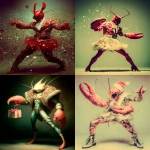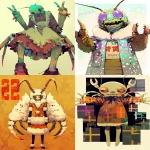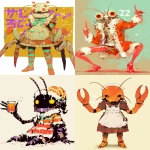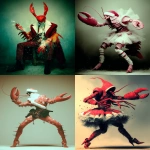Explore the Best AI Image Gallery

AI and Digital Creativity: Shaping Tomorrow's Artistic Landscape
The emergence of artificial intelligence (AI) has significantly transformed various sectors, and the creative industry is no exception. Today, AI is playing a crucial role in digital creativity, propelling artists, designers, and creators into a new era of artistic expression and innovation. As we navigate this technological evolution, it's essential to explore the multifaceted impact AI has on creativity, the potential applications it offers, the ethical considerations it raises, and the future trends that may shape this domain.
The Impact of AI on the Creative Industry
AI technologies are reshaping the creative landscape by providing tools that enhance artistic capabilities. For instance, generative design software utilizes algorithms to create unique designs based on user inputs. This technology allows designers to explore a vast array of possibilities, leading to unexpected and innovative outcomes. Artists can generate artwork collaboratively with AI, producing pieces that reflect both human emotions and machine learning capabilities.
Moreover, AI-powered platforms are assisting in content creation, such as writing, music composition, and video production. Tools like OpenAI's ChatGPT have revolutionized the way writers generate ideas and draft content. Musicians can use AI to compose melodies that inspire, while filmmakers can leverage AI to suggest narrative elements or perform video editing efficiently. The democratization of these tools means that individuals without formal training can create high-quality content, breaking down traditional barriers in the creative process.
Potential Uses of AI in Creativity
AI's ability to process large amounts of data and learn from it makes it uniquely positioned to enhance creativity in several domains:
- Visual Art: Artists can use AI models to generate unique images or enhance their work with tools that suggest color palettes, shapes, and styles.
- Writing: AI writing assistants can help authors brainstorm, edit, or even generate entire stories drawn from diverse sources of inspiration.
- Music: AI technologies enable musicians to experiment with compositions and analyze existing music to create stunning new pieces.
- Gaming: Game developers utilize AI to create dynamic storylines and adaptive gameplay based on player interactions.
Ethical Considerations in AI Creativity
Despite the benefits AI offers for creative pursuits, significant ethical considerations arise from its use. Copyright issues are at the forefront as artists question who owns the rights to AI-generated works. If a machine produces a piece of art, is it the creator of the algorithm, the programmer, or the end user who has the claim to that work?
Moreover, the concept of originality is challenged in an era where machines can replicate styles and generate art based on learned patterns. This raises pivotal questions about the value of human creativity and the essence of artistic expression. As AI models are trained on vast datasets, there's also concern about the potential for perpetuating biases present in those datasets, leading to unfair representations in creative works.
Future Trends in AI and Digital Creativity
As we look ahead, several trends are likely to shape the future of AI in the creative industry:
- Increased Collaboration: The partnership between humans and AI will deepen, with both parties contributing equally to creative processes.
- Personalization: AI can enhance user experience by tailoring content to individual tastes and preferences, thereby enriching engagement.
- Expanded Accessibility: As AI tools become more user-friendly and affordable, more individuals will engage in creative activities.
- Curation and Recommendation Systems: AI will significantly improve the discovery of art and creative content, allowing users to find relevant work amidst an overwhelming amount of digital information.
Conclusion
The integration of AI into digital creativity continues to transform the landscape of artistic expression. From enhancing traditional art forms to reshaping creative processes, AI's potential is both vast and exciting. As we embrace these innovations, it is crucial to maintain a dialogue around the ethical implications and strive for a balance that honors human creativity while exploring the capabilities of AI. The future of digital creativity lies not only in what machines can create but also in how artists, designers, and content creators harness this technology to push the boundaries of their craft.
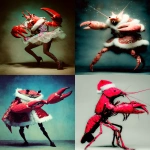
](https://images.ai-img.art/thumbnails/150/124afc0facac1c0c676099ab4d2aae88da73c9ba0b89d1f6de454d8b236458ef.webp)
